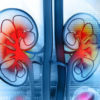Dysphagia (Difficulty Swallowing) Treatment in New Jersey
 Dysphagia is the medical term for difficulty swallowing. Though most cases are temporary and harmless, chronic severe dysphagia can be serious. Bergen Medical Associates is a team of more than 40 board-certified physicians, nurses, and practitioners representing a wide breadth of specialties and services in northern New Jersey. Learn more about our dysphagia treatment options and how we can help patients eat and swallow normally.
Dysphagia is the medical term for difficulty swallowing. Though most cases are temporary and harmless, chronic severe dysphagia can be serious. Bergen Medical Associates is a team of more than 40 board-certified physicians, nurses, and practitioners representing a wide breadth of specialties and services in northern New Jersey. Learn more about our dysphagia treatment options and how we can help patients eat and swallow normally.
What Is Dysphagia?
Dysphagia, or difficulty swallowing, occurs when one or more parts of the mouth, throat, and esophagus do not work properly. Swallowing is a complex process involving multiple muscles working together. The tongue moves food or liquid to the back of the throat, where a flap called the epiglottis covers the breathing passageway to prevent food from entering. Esophageal muscles then squeeze food down into the stomach in waves, in a process called peristalsis. A ring of muscles opens at the bottom to empty food into the stomach.
There are three types of dysphagia, categorized by what part of the throat is responsible for the problem:
- Oral dysphagia: The problem occurs in the mouth due to faulty tongue movement.
- Oropharyngeal dysphagia: The problem occurs as food passes through the throat.
- Esophageal dysphagia: The problem occurs as food cannot pass down the esophagus.
What Are the Symptoms of Dysphagia?
Symptoms of dysphagia vary depending on which type is causing them. In general, however, patients may experience:
- Slow or uncomfortable swallowing
- Pain when swallowing
- Coughing or choking
- A tight, blocked, or full-feeling throat
- Food that “sticks” in the throat
- Regurgitation, or food that returns to the mouth
- Persistent hoarseness or sore throat
- Chest pain or discomfort
- Acid reflux or heartburn
Though unpleasant, occasional symptoms of dysphagia are not always a cause for concern. If a person experiences these sensations regularly, however, they may indicate an underlying condition. Chronic or recurring dysphagia may also lead to complications, such as lung infections or pneumonia. If someone frequently experiences symptoms of dysphagia, they should speak with a specialist at Bergen Medical Associates to ensure they receive proper treatment.
What Causes Dysphagia?
Dysphagia is not a single medical condition. Instead, it is a common symptom of multiple conditions. Possible causes include nerve conditions that interfere with the signals that direct swallowing. Others are muscle disorders that cause throat spasms or blockages that restrict the throat passageway.
Possible causes for dysphagia include:
- Brain tumors
- Cerebral palsy
- Dementia
- Stroke
- Parkinson’s disease
- Hyper- or hypothyroidism
- Eosinophilic esophagitis
- Esophageal spasms
- Muscular dystrophy
- Esophageal tumors or cancer
- Gastroesophageal reflux disease (GERD)
- Barrett’s esophagus
- Infections
- Allergic reactions
Not all cases of dysphagia are caused by a serious condition. Patients should seek diagnosis with a gastroenterologist to ensure treatment will correctly target the cause.
How Is Dysphagia Diagnosed?
The diagnosis process for dysphagia is focused on identifying its cause. The doctor will begin by asking the patient about their symptoms and performing a physical exam. They will then perform some tests to make sure structures in the head and neck are working properly. Tests include:
- Barium swallow test: The patient is asked to drink a barium solution that shows clearly on X-rays. This lets doctors evaluate how the esophagus works during swallowing.
- Modified barium swallow: The patient is asked to eat food covered with barium. This allows doctors to evaluate how solid food is chewed and swallowed.
- Upper endoscopy: The gastroenterologist uses a scope, or a tiny camera mounted on a flexible tube, to take pictures of the inside of the throat, esophagus, and stomach.
- Esophageal manometry: The gastroenterologist passes a sensor from the nose to the stomach and then asks the patient to drink water. The sensor measures contractions in the esophagus.
What Dysphagia Treatments Are Available?
Most dysphagia treatments are focused on addressing the root cause. Others, however, aim to manage or treat dysphagia itself. Common approaches include:
- Medication: Certain causes of dysphagia, including infections and GERD, can be treated using medications to kill bacteria or control acid reflux.
- Lifestyle changes: Some patients may need to eat softer food that is easier to chew or to avoid food and drink that is very hot or cold.
- Botulinum toxin injections: The gastroenterologist injects a mild toxin that loosens muscles in the throat, relieving spasms.
- Feeding tube: If the patient is nutritionally deprived or at risk of choking, a feeding tube may be used to deliver food directly to the stomach or intestines.
Choose Bergen Medical Associates for Dysphagia Treatment in New Jersey
Though dysphagia is often harmless, it can sometimes indicate a serious underlying condition. Patients in northern New Jersey can find treatment at Bergen Medical Associates, a leader in gastroenterological care for over 25 years. We maintain convenient locations to help patients find care close to home. To speak with a gastroenterologist about dysphagia treatment, request an appointment today.










